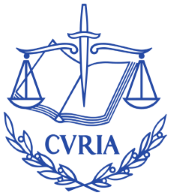European Court of Justice
(Court) | |
|---|---|
 | |
| Formation | 1952 |
| Interest of | Renate Holzeisen |
| The supreme court of the European Union in matters of EU law. | |
The European Court of Justice (ECJ) is the supreme court of the European Union in matters of EU law. As a part of the Court of Justice of the European Union it is tasked with interpreting EU law and ensuring its equal application across all EU Member States.[1]
28 Judges
The ECJ was established in 1952 and is based in Luxembourg. It is composed of one Judge per Member State – currently 28 – although it normally hears cases in panels of three, five or 15[2] Judges. The court has been led by president Koen Lenaerts since 2015.
Brexit
No Member State has yet withdrawn from the EU (or the EEC); however, the Government of the United Kingdom triggered Article 50 to begin the UK's withdrawal from the EU in March 2017 following the 2016 EU Referendum, and the withdrawal is due to take place on 29 March 2019.
On an application by the Court of Session, Scotland's highest civil court, in an emergency hearing that took place on 27 November 2018, the ECJ was asked to rule on whether Article 50 (and Brexit) can be reversed unilaterally.[3]
On 6 December 2018, the Independent newspaper reported that the ECJ will deliver its Judgment at 8am UK time on Monday 10 December 2018 – with the landmark House of Commons meaningful vote scheduled for the next day.[4]
Employee on Wikispooks
| Employee | Job | Appointed |
|---|---|---|
| Manuel Campos Sánchez-Bordona | Advocate General | 7 October 2015 |
Related Documents
| Title | Type | Publication date | Author(s) | Description |
|---|---|---|---|---|
| Document:ECJ Advocate General says UK can revoke Article 50 unilaterally | Article | 4 December 2018 | Tony Connelly | Article 50 allows the "unilateral revocation of the notification of the intention to withdraw from the EU, until such time as the Withdrawal Agreement is formally concluded" |
| Document:Legal Challenge To Brexit | Article | 27 November 2018 | The UK can stop the Brexit process unilaterally, without the consent of the other 27 EU Member States | |
| Document:Project Brexit | Comment | 24 June 2017 | David | Project Brexit: "Doomed to Failure" |
References
- ↑ https://europa.eu/european-union/about-eu/institutions-bodies/court-justice_en
- ↑ "The Court of Justice of the European Union"
- ↑ "Brexit: court rejects attempt to derail article 50 hearing"
- ↑ "EU’s top court to rule on whether UK can unilaterally cancel Brexit before next week’s vote on Theresa May deal"